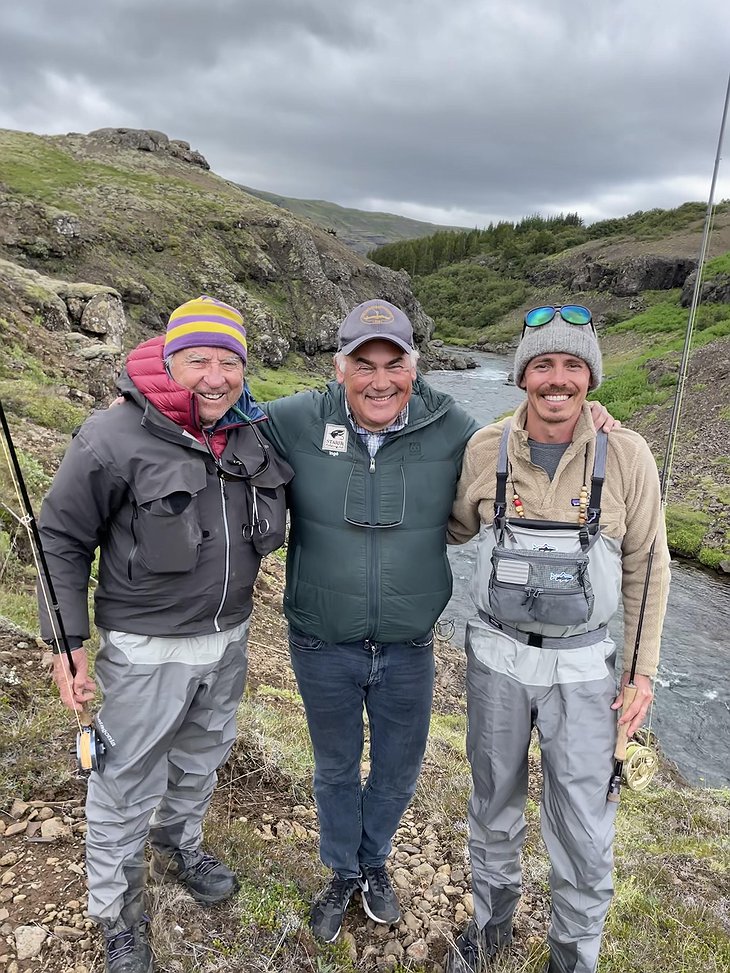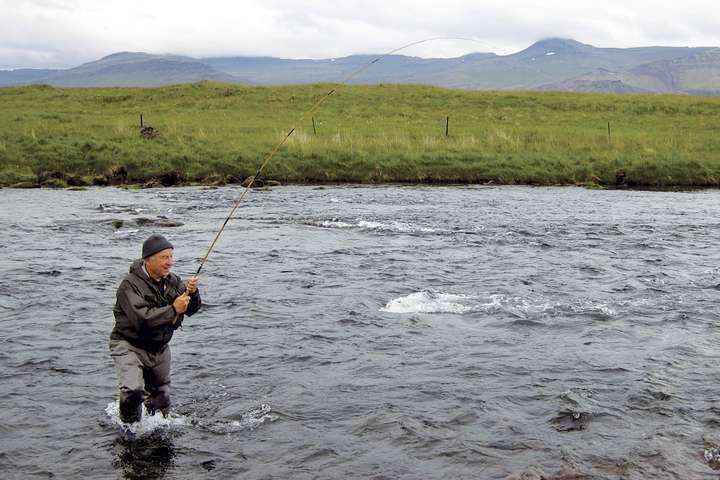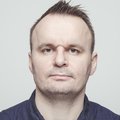"I have been working to try to save wild salmon around the world for many years. I have been a fly fisherman for almost 80 years and have fished in Iceland, Russia, Canada, and elsewhere. I love salmon, and it is part of Patagonia's mission to do our part in trying to save our home planet and everything that belongs to it," says Yvon Chouinard, founder of the American clothing company Patagonia, when asked about the documentary about open-net salmon farming in Iceland that the company made and premiered in early February. Yvon granted Heimildin an interview following the premiere to put the making of the film into context.
Yvon is now 85 years old and has been coming to Iceland regularly since 1960, when he was in his early twenties. "Open-net salmon farming in Iceland is the next logical place to fight. This is a war and we believe we can win it," he says about the fight against open-net salmon farming, globally.
"I think it is a realistic goal to rid the world of open-net salmon farming."
Has great faith in film
He says he has great faith in film as an art form to influence people for a specific purpose. "We provide grants to organizations and individuals around the world, but sometimes it's just much more effective to make a documentary. Your emotions affect you. If you read a book, you don't get as emotionally moved as when you see a movie."
The documentary about Iceland is just one of many films Patagonia makes. The company has also made films about environmental issues such as dams and their impact on nature. "Films are a very powerful tool, and at Patagonia, we make many films every year about how we can save our nature. If we were to make a film about salmon farming in the world in general, it would not be as impactful in Iceland as making a film that focuses on the situation Iceland. If we want to talk about the problems of salmon farming in Tasmania, we make a film that is just about the problems in Tasmania."
Surprised by the state of Icelandic salmon rivers
Yvon and Patagonia have been directly involved in fighting against open-net salmon farming in Iceland, and in many other places, for many years. Both Yvon and Patagonia's CEO, Ryan Gellert, recently wrote comments on Svandís Svavarsdóttir's bill on fish farming in Iceland.
The last time Yvon came to Iceland, in the summer of 2022, he met with Guðni Th. Jóhannesson, the President of Iceland, and discussed open-net salmon farming with him, in addition to fishing in several salmon rivers, including Laxá in Aðaldalur. "I was stunned to see how much salmon fishing in Iceland has declined. I don't remember if I even caught a salmon on this trip. In comparison, I fish for salmon in Labrador every year, and last year I caught more than 100 salmon in eleven days. In Iceland, it has become such that in a week you might catch 2 or 3 salmon," he says.
Yvon says he has fished in eight to ten salmon rivers in Iceland over the years and that his favorite river is Haffjarðará in Snæfellsnes, where he caught the most memorable salmon he has caught in the country. "I once caught a 20-pound salmon on a small fly called Madeleine in Haffjarðará. It's a size 20 treble hook, with only five bear hairs on it. Nothing else. I hitched it on the surface and made a small V with the fly. It was amazing, and this is a very large fish for this river," he says.
Gave the company and funds the fight for environmental protection
Patagonia is a world-renowned clothing brand that produces outdoor clothing for silent sports such as climbing, surfing, and fly fishing. The company is known for its involvement in the environmental debate, and its campaigns have garnered much attention over the years.
One of them, placed in the New York Times on Black Friday 2011, was about asking people to refrain from buying the company's products because then they could contribute to the fight against over-consumption and global warming. "Don't buy this jacket," the ad read, alongside a photo of a Patagonia jacket.
Yvon Chouinard himself made global headlines in September 2022 when he made earth the company’s only shareholder, creating a new business structure so that every dollar that is not reinvested back into Patagonia would be distributed as dividends to support environmental issues, including the "war against open-net salmon farming," as Yvon puts it to Heimildin.
What motivates Yvon and Patagonia in Iceland?
When asked why he and Patagonia are fighting against open-net salmon farming in Iceland, Yvon says it is possible to achieve success in that fight. "The state of environmental issues in the world is so bad that you need to work to see the positives. One of the problems with supporting activism is that it is so rare to have real victories, which can be really depressing. However, I think it is a realistic goal to rid the world of open-net salmon farming."
One of the things Yvon always dwells on when he talks about Iceland is that democracy works well in the country, the people are well-educated and informed, and this helps him believe that it is possible to ban salmon farming in the country. Yvon says he is therefore engaged in a fight he believes in. "We have managed to get open-net salmon farming thrown out of Argentina, we are succeeding in doing the same in the state of Maine in the United States, we are working on getting it banned on the East and West Coasts of Canada, in Tasmania, and in Iceland. I think it is a realistic goal for open-net salmon farming to be banned in Iceland. This is a fight we can win. Iceland is a small country with few inhabitants and voters who are well-educated and informed and listen to science."

Iceland as an example because of informed voters
He says he often uses Iceland as a parable when he gives speeches around the world, as he considers it to be more evolved than the United States in certain aspects, including in terms of education and democracy. "The only thing you have in Iceland is hot and cold water and fish. There are no trees, no forestry, mining, or anything. When you look at natural resources, Iceland has very little. Then you look at the United States, which has so many resources, but we squander them. The roads in Iceland are good, they are not potholed, but in comparison, the roads in the United States are terrible. Iceland is an example of a country that knows its limitations and works with the little it has. In my mind, Iceland is a role model for other countries in the world. We Americans don't realize our limitations. We have always looked further west when we have needed more natural resources. Now we are constantly looking for more natural resources all over the world to abuse. We don't understand that there are limits to how far we can go. When you live on an island like Iceland, I think you understand better that there are limits to how much you can encroach on nature. "
Yvon cites as an example that for a long time, the Prime Minister of Iceland was simply listed in the phone book, and people could find his number and call him. This is a detail that has often caught the attention of foreigners, such as journalists, who have come here. In most other countries, it is almost impossible to call ministers directly and talk to them without intermediaries.
Ate cod for every meal at the seamen's home
Having come to Iceland so often over the years, Yvon has various amusing stories to tell about the country. One of them is about his first visit to the country in 1960. As Yvon has recounted in books he has written, he was poor as a young man; slept outdoors under the open sky and ate pet food and even porcupines. At times, he lived a life reminiscent of a vagrant's existence and was arrested in the United States for appearing to be a drifter.
He was in this state during his first visit to Iceland when his life largely revolved around climbing and hiking. "When I first came to Iceland, I was a young climber on my way to the Alps. I came with Icelandair and decided to look around Iceland because I had a stopover here. Of course, I had no money, so the first day I stayed on the stone floor of the hangar in my sleeping bag."
Yvon then headed to Reykjavík but realized that there wasn't much to be found there. "The next day, I hitchhiked a ride to Reykjavík. At that time, there were no lights in Reykjavík after eight o'clock in the evening. There were no restaurants in the city, and I had no money, so I had to eat at the seamen's home. I ate cod in the morning, cod for lunch, and cod in the evening. It was amazing, it was such a long time ago."
Since then, a lot of water has flowed under the bridge. Yvon founded Patagonia, starting out by designing specialized climbing equipment, and things started rolling for him, even though he never has had a particular interest in being rich.
Science and reason
After Patagonia's documentary about open-net salmon farming premiered, it was criticized by the CEO of the Norwegian salmon farming company Mowi, the largest shareholder of the salmon farming company Arctic Fish in the small town of Ísafjörður in Iceland. In an interview with the Norwegian seafood newspaper Intrafish, the CEO, Ivan Vindheim, said he believes that "reason will prevail" in Iceland and elsewhere in the world and that open-net salmon farming will thrive. The headline of the article about Mowi's criticism was that Mowi is not afraid of "Patagonia's attack on salmon farming in Iceland".
When asked about these comments by Ivan Vindheim, Yvon says he is of the opinion that science will prevail, and open-net salmon farming will not be viable based on the scientific findings about its harmfulness. "I think science will prevail, which is a bit different from reason in my mind. If you listen to the science, it simply doesn't add up in any way that we are engaging in open-net salmon farming. Four books have been published recently about the harmfulness of open-net salmon farming. Their conclusion is simply that there is no right way to do this in the sea. It's not about mitigation measures or fixing this industry in some way. It's just not possible to do open -net salmon farming in a correct and sustainable manner."
The difference between reason and science in this debate is that science does not take into account financial and regional development arguments, but salmon farming in open-net pens in Iceland is primarily justified by these factors. Sometimes these arguments are referred to as "mitigation measures" to strengthen the sparsely populated regions of the Westfjords and Eastfjords, where salmon farming takes place. Yvon does not believe in these arguments in the long run and believes that science will prevail as production methods for farmed fish that are more sustainable and environmentally friendly than open-net farming will emerge.
Invests in land-based farming, which he considers more sustainable
Instead of open-net salmonfarming, Yvon Chouinard believes that land-based salmon farming is the way to go. "We have another option, which is to farm salmon on land in a sustainable way. It is not possible to farm salmon in the sea in any way without causing damage to nature."
Yvon has personally invested in land-based salmon farming in the United States. This has been covered in foreign seafood media. He says he did not do this to make money but to support the development of land-based farming as an industry. "I didn't invest in this to make money. I did it to guide them in making land-based farming as sustainable as possible. As far as I know, this is the only salmon farm in the world that has no environmental impact, it doesn't pollute at all."
A big part of this work is to create feed for the farmed salmon that does not come from the animal kingdom. Today, the feed that farmed salmon eat comes mainly from the sea, from pelagic fish that are turned into meal. "We are working to improve where the feed for the salmon comes from because it is irresponsible to catch sardines, herring, anchovies and mackerel all over the world to produce feed for farmed salmon. We are working to develop our own feed for land-farmed salmon by growing vegetarian fish in rice fields in Argentina. The fish only feed on plankton and rice, and we make feed from these fish and add black soldier fly larvae that feed on agricultural waste . So all the feed is from waste, and we give this to the salmon and it grows 25 percent faster, and we are not using the sea to grow the salmon."
Yvon says this is the path that needs to be taken to get open-net pen farming companies to stop doing it: Companies need to be shown that other, more sustainable ways of producing farmed salmon are possible. "If you corner a tiger, it will fight to its death unless you give it some other way out. There is a possibility for open-net salmon farming companies to take it on land: We don't need to farm in the sea. It will also help that consumers will realize that they are eating a toxic product when they eat salmon that is farmed in opnen net-pens," says Yvon, referring again to his belief that the fight to stop to open-net salmon farming begins and ends with the public: The citizens who control whether it will be banned here In Iceland, and elsewhere, or not.






















































Athugasemdir